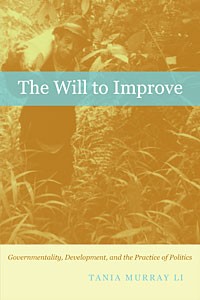For anyone interested in international development, this is essential reading. The opening chapters of the book are academic, and I suspect this has contributed to it mostly being engaged with by academics. However, Li's book is highly recommended for practitioners, even if that means skimming some parts. What follows is not a summary of The Will to Improve, rather it pulls a selection of quotes aimed to inspire critical reflection.
On "rendering technical":
- "Two key practices are required to translate the will to improve into explicit programs. One is problematization, that is, identifying deficiencies that need to be rectified. The second is the practice I call "rendering technical," a short-hand for what is actually a whole set of practices concerned with representing "the domain to be governed as an intelligible field with specifiable limits and particular characteristics … defining boundaries, rendering that within them visible, assembling information about that which is included and devising techniques to mobilize the forces and entities thus revealed"." (p. 7)
On project failure (or the wrong success?):
- "CARE was more consistent than the ADB with its agricultural program and its free farm inputs, and extension services did benefit some farmers. This modest success revealed two further flaws in the program logic. First, the "target group" CARE deemed most likely to encroach on the park – poor villagers – were not able to take advantage of CARE's inputs because they had no farms. If they had some cacao, they wanted it to produce maximum incomes as soon as possible. They did not have the luxury to or incentive to prioritize long-term ecological stability. Thus CARE's agricultural interventions were captured by the village elite. Excluded villages saw CARE as yet another vehicle of patronage operating in their name but not for their benefit. Second, farmers who benefited from CARE's attentions acquired new resources and added incentive to expand their holdings outside the park, where they bought up the land of their impoverished neighbors. They also expanded their holdings inside the park. Thus agricultural improvement did not promote conservation, it undermined it." (p. 137)
On Complexities:
- "Scores of interviews I conducted with resettlers in Rahmat and other resettlement sites convinced me that they share this concept of improvement. In Rahmat, settlers expressed a desire to become modular farmers of the kind the resettlement program proposed. They had no nostalgia for life in the hills. Nor did they voice a desire for modernity simply for my consumption. Their desire was confirmed by the actions of hundreds of hill families who applied to join resettlement schemes or subsequently moved in around the edges, hoping to escape their isolation and improve their lot. Rahmat settlers characterized their former life in the hills very concretely in terms of the number of days and nights it took to carry their coffee to market, and the dismal returns for their labor. They had food, they said, but no money for clothes, batteries, sugar, kerosene, or other modest consumer requirements. There was no education for their children. Thus their critique of resettlement was not focused on what they had lost. It was focused, rather, on what the program promised but failed to deliver…" (p. 91)
On the practice of development and the practice of ethnography:
- "I find an ethnographic appreciation of the complexities of rural relations to be antithetical to the position of an expert. This might seem counterintuitive. Surely a person like me, after more than a decade of research, has ideas about how to translate that knowledge into effective programs that help people? Indeed, I am sometimes asked by anthropologically trained development administrations in Indonesia to provide suggestions about what they should do. More specifically, they ask me to provide them with a bridge between my research describing the dynamics of rural life, which some of them have read, and the world of projects, which they inhabit. Such a bridge eludes me. Why is it, I ask myself, that so many experts can examine Indonesia and devise programs to improve it, whereas I cannot? This is not a matter of coyness or modesty on my part. Still less am I indifferent to the problems of poverty, disease, and ecological disaster that experts seek to resolve. I believe my predicament is diagnostic. It enables me to ask what ways of thinking, what practices and assumptions are required to translate messy conjunctures, with all the processes that run through them, into linear narratives of problems, interventions, and beneficial results." (p. 3-4)

